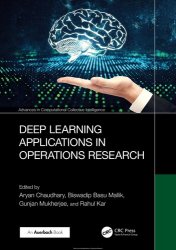 Название: Data Analytics and Digital Transformation
Название: Data Analytics and Digital TransformationАвтор: Erik Beulen, Marla A. Dans
Издательство: Routledge
Год: 2024
Страниц: 257
Язык: английский
Формат: pdf (true), djvu
Размер: 10.1 MB
Understanding the significance of data analytics is paramount for digital transformation but in many organizations they are separate units without fully aligned goals. As organizations are applying digital transformations to be adaptive and agile in a competitive environment, data analytics can play a critical role in their success. This book explores the crossroads between them and how to leverage their connection for improved business outcomes. The need to collaborate and share data is becoming an integral part of digital transformation. This not only creates new opportunities but also requires well-considered and continuously assessed decision-making as competitiveness is at stake. This book details approaches, concepts, and frameworks, as well as actionable insights and good practices, including combined data management and agile concepts. Critical issues are discussed such as data quality and data governance, as well as compliance, privacy, and ethics. It also offers insights into how both private and public organizations can innovate and keep up with growing data volumes and increasing technological developments in the short, mid, and long term. This book will be of direct appeal to global researchers and students across a range of business disciplines, including technology and innovation management, organizational studies, and strategic management. It is also relevant for policy makers, regulators, and executives of private and public organizations looking to implement successful transformation policies.
Volumes of data are growing at an unprecedented speed, driven by the Internet of Things (IoT) and unstructured data (e.g. social media content), as well as additional data generated by transforming into digital organizations. This feeds back into data analytics as well as Data Science, requiring even more mature data management and governance to achieve enriched insights. In addition, the need to collaborate and share data is becoming an integral part of digital transformations. This not only creates new opportunities but also requires well-considered and continuously assessed decision-making as competitiveness is at stake. This book details approaches, concepts, and frameworks, as well as actionable insights and good practices, including combined data management and agile concepts. In addition, a deep dive into privacy and ethics will be included.
Intuition and experience need to be powered by data analytics. Organizations need to integrate data-driven decision-making into their DNA. Data-driven decision-making is not limited to incremental (investment) decisions, it also extends to decision-making in day-to-day operations and processes. Improved incremental decision-making typically supports the more strategic decision-making by senior management and higher. Predictive and prescriptive Artificial Intelligence (AI) models predict future outcomes, enabling the decision maker to choose the best future course of action.
Examples of data-driven algorithms are decision trees, support vector machines (SVM), K-means, k nearest neighbor (kNN), Adaboost, and Deep Learning (DL) algorithms. These will further drive innovation. This outlook is particularly relevant for decision-making in day-to-day processes; automatic pricing adjustments based on inventory, demand, and competitor pricing in retail would be good examples for data-driven analytics. In this book, data-driven analytics is embedded in data-driven decision-making.
Скачать Data Analytics and Digital Transformation
[related-news] [/related-news]
Комментарии 0
Комментариев пока нет. Стань первым!















